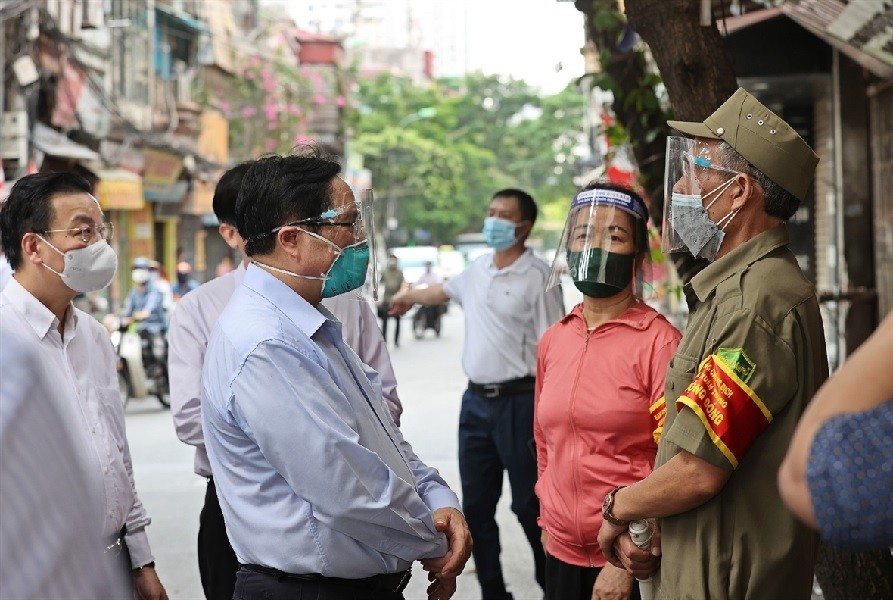
People’s confidence and trust: The key to a successful response to COVID-19
Latest
"The Vietnamese government always cares about and puts the health and lives of the people first", The Diplomat wrote. This is also the Party, State, and Government's overarching purpose of "leaving no one behind".
 |
| Prime Minister Pham Minh Chinh encouraged people and officials in COVID-19 hotspots. (Photo: VNA) |
Timely action
Ever since the pandemic broke out, indicating the "war" is likely to last, the government has implemented a series of policies and has issued various resolutions aimed at the people, assuring their health, safety, and livelihood, such as approving a support package of 62,000 billion VND in 2020 and another 26,000 billion VND in 2021, organizing flights to welcome overseas Vietnamese home...
In 2021, as the fourth wave of the pandemic takes a toll on Viet Nam, at times, the country recorded over 10,000 cases daily, along with significant loss of life. This was considered the most severe wave ever, and it left the whole nation crawling in pain.
Furthermore, the pandemic has had a significant impact on Viet Nam's socio-economic development. It also potentially left negative and long-term effects on people's physical and mental health, as well as the education of an entire generation of students.
According to a recent survey conducted by the United Nations Development Program (UNDP) and the Mekong Development Research Institute (MDRI) with the support and collaboration of Australia's Department of Foreign Affairs and Trade (DFAT), the pandemic's impact in 2021 was more serious compared to 2020.
Approximately 68% of respondents are concerned about their own health, while 76% are worried about their children's education. 77% of respondents are aware that their earnings have been devalued, particularly those from low-income families, ethnic minorities, and self-employed workers...
Against this backdrop, the Prime Minister organized and chaired a nationwide virtual meeting with the participation of all 63 provinces and cities on pandemic prevention and control. He also personally visited each commune and ward where the number of cases is high.
At the same time, the Government issued Resolution 128/NQ-CP on "Safely adapting, flexibly and effectively controlling the COVID-19 pandemic", both fighting the epidemic and bringing socio-economic activities and people's lives to normal, creating conditions for people to work, study and develop.
In addition, Viet Nam strives to implement the Vaccine Strategy in a dramatic, simultaneous, and logical manner, with vaccine diplomacy considered as a spearhead, in order to achieve the goal of free vaccination for the entire population. As of December 9th, 129,965,296 doses of vaccination had been administered to the people.
Minister of Health Nguyen Thanh Long stated that the pandemic situation has been largely under control across the country. Aside from that, the economy is gradually improving with many bright spots, and people's lives are also returning to a new normal.
Caitlin Wiesen, UNDP Resident Representative in Viet Nam, believes that putting people's health at the center of the COVID-19 response is the right approach.
People’s support
The people have responded well to the drastic and effective implementation of the COVID-19 policy, carrying out the dual goals of containing the pandemic while ensuring economic activity, people's lives, and social security.
Despite the negative economic consequences, up to 83% of respondents think that "the State's primary priority right now is to save people’s lives from COVID-19, even at the expense of economic development," according to a UNDP survey.
The people also expressed strong support for most of the steps taken by authorities at all levels during the fourth COVID-19 wave to prevent and contain the pandemic. Up to 84% of respondents rated the government's response as good or very good, while 89% viewed the provincial government's response as good or very good.
However, there are still comments indicating that the government's help packages are inaccessible and ineffective. Accordingly, information on the assistance package has not been disseminated effectively or appropriately to disadvantaged groups such as ethnic minorities, those who live in rural areas, and so on.
Meanwhile, those who have received the support appreciate the promptness and adherence to regulations, although some consider that the process is complicated.
Furthermore, public administrative services are inflexible and inconvenient for the demands of the public.
According to Ms. Wiesen, UNDP Representative in Viet Nam, Viet Nam's experience has shown the world that people's trust and faith in the government's response to the pandemic is the key to success.





















